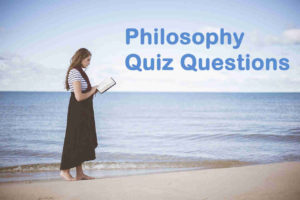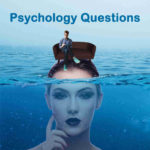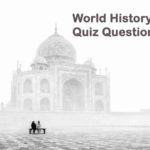100 Philosophy Quiz Questions and Answers

Top 100 General Philosophy Quiz Questions and Answers Part 1
1) What is Philosophy?
Answer: The study that seeks to understand the mysteries of existence and reality.
2) The term philosophy comes from:
Answer: The Greek word ‘Philosophia’.
3) What is the meaning of ‘Philosophia’?
Answer: Love of wisdom.
4) Mechanism maintains:
Answer: All happenings result from purely mechanical force, not from purpose and that it makes no sense to speak of the universe itself as having a purpose.
5) Technology states:
Answer: The universe and everything in it exists and occurs for some purpose.
6) Which aims to determine the nature, basis and extent of knowledge?
Answer: Epistemology.
7) ‘The various ways of knowing, the nature of truth and the relationship between knowledge and belief’ is explored by:
Answer: Epistemology.
8) Philosophers often distinguish between how many kinds of knowledge? What are they?
Answer: Two, Priori and Empirical.
9) Which theory states that an idea is true if it corresponds to the facts or reality?
Answer: Correspondence theory.
10) Which theory maintains that an idea is true if it works or settles the problem it deals with?
Answer: Pragmatic theory.
11) The coherence theory states:
Answer: Truth is a matter of degree and that an idea is true to the extent to which it fits together with other ideas that one hold.
12) Which is the philosophy that claims ‘we can never have real knowledge of anything’?
Answer: Skepticism.
13) Which is the study of principles and methods of reasoning?
Answer: Logic.
14) Logic explores:
Answer: Mow we distinguish between good reasoning and bad reasoning.
15) What is called an instance of reasoning?
Answer: Argument or an inference.
16) How many types of reasonings are there? Which are they?
Answer: Two, Deductive and Inductive.
17) A deductive argument whose conclusion necessarily follows from the premises is said to be:
Answer: Valid.
18) A deductive argument whose conclusion does not necessarily follow from the premises:
Answer: Invalid.
19) Which is the study of the nature of right and wrong and the distinction between good and evil?
Answer: Ethics.
20) The nature of justice and of a just society and also one’s obligations to oneself, to others and to the society is explored by:
Answer: Ethics.
Philosophy Quiz Questions and Answers Part 2 (Quiz 21-40)
21) Relativism maintains:
Answer: What is right or wrong depends on the particular culture concerned.
22) Objectivism claims:
Answer: There are objective standards of right and wrong which can be discovered and which apply to every one.
23) Which states that all moral standards are subjective matters of taste or opinion?
Answer: Subjectivism.
24) Which is the study of art and beauty?
Answer: Aesthetics.
25) The doctrine that all events have causes and occur by necessity:
Answer: Determinism.
26) Dialectic in the philosophy of Georg Wilhelm Friedrich Hegel denotes:
Answer: Is a process of change brought about by the conflict of opposites.
27) The pleasure should be the goal of human activity but that true pleasure depends on self control, moderation and honorable behaviour’ is the belief of:
Answer: Epicureanism.
28) What is the belief of Hedonism?
Answer: The pleasure is the highest good.
29) Which is the philosophy that stresses the importance of human beings and their nature and place in the universe?
Answer: Humanism.
30) The theory that knowledge can be derived from reason by itself, independent of the senses is:
Answer: Rationalism.
31) The doctorine that things exist in and of themselves, independent of ideas that people may have about them:
Answer: Realism.
32) What is utilitarianism?
Answer: Is the belief that human conduct should be based on what produces the greatest good for the greatest number of people.
33) The relationship between philosophy and other fields of human activity can be seen by examining which two fields?
Answer: Philosophy and science, philosophy and religion.
34) Which field studies the natural phenomena and the phenomena of society?
Answer: Philosophy and science.
35) Upto which period there was no distinction made between science and philosophy?
Answer: 1700’s.
36) In which period the sociology and linguistics separated from philosophy?
Answer: Early 1800’s.
37) Historically, philosophy originated from what?
Answer: Religious questions.
38) Religious questions concerned with what?
Answer: The nature and purpose of life and death and the relationship of humanity to superhuman powers or a divine creator.
39) Which are the two main traditions in oriental philosophy?
Answer: Chinese and Indian.
40) In origin and character which philosophies are basically religious and ethical?
Answer: Indian and Chinese.
Philosophy Quiz Questions and Answers Part 3 (Quiz 41-60)
41) Traditionally, Chinese philosophy is:
Answer: Largely practical, humanistic and social in its aims.
42) When and with whom the Chinese philosophy was known?
Answer: In B.C 500’s, Confucius.
43) Name of the philosophy of Confucius?
Answer: Confucianism.
44) Which was the official philosophy of China for centuries?
Answer: Confucianism.
45) What are the other philosophic traditions in China?
Answer: Taoism, Mohism and Realism.
46) When did the movement Neo-Confucianism begin?
Answer: In 1100’s.
47) In India, philosophic thought was mingled with what?
Answer: Religion.
48) When was philosophic commentaries on sacred texts emerged?
Answer: In B.C 500’s.
49) The Indian word for studying the philosophic commentaries on sacred texts is:
Answer: Darshana.
50) What is the meaning of the word ‘Darshana’?
Answer: Vision or seeing.
51) Freedom from the sufferings and tension caused by the body and the senses and by attachment to worldly thing are the main aim of:
Answer: Indian philosophy.
52) Which were the main philosophies developed in India?
Answer: Hinduism and Buddhism.
53) The philosophic ideas ‘reincarnation’ has been influenced in which part of India?
Answer: West.
54) In philosophy ’the belief that the human soul is successively reborn in new bodies is called:
Answer: Reincarnation.
55) The history of Western philosophy is commonly divided into how many periods?
Answer: Three.
56) What are the three periods in Western philosophy?
Answer: Ancient, medieval and modern.
57) The period of ancient philosophy:
Answer: About B.C 600 to A.D 400’s.
58) The period of medieval philosophy:
Answer: From 400’s to 1600’s.
59) Modern philosophy covers which period?
Answer: From 1600’s to the present.
60) Ancient philosophy was almost entirely:
Answer: Greek.
Philosophy Quiz Questions and Answers Part 4 (Quiz 61-80)
61) Which are the most known ancient philosophers of Greek?
Answer: Socrates, Plato and Aristotle.
62) During which period the ancient philosophers of Greek were lived?
Answer: B.C 400’s and 300’s.
63) The first Greek philosophers were known as:
Answer: Pre-Socratics.
64) The Pre-Socratics were lived:
Answer: About B.C 469.
65) Where was Socrates lived?
Answer: Athens.
66) The procedure of Socrates is known as:
Answer: Socratic method.
67) According to Plato, the changeless things such as truth, beauty and goodness, which are known by mind are:
Answer: Ideas or forms.
68) Who taught that only ideas are real and that all other things only reflect ideas?
Answer: Plato.
69) Plato’s view became known as:
Answer: Idealism.
70) Who was the famous pupil of Socrates?
Answer: Plato.
71) The period in which Socrates lived?
Answer: B.C 470-399.
72) In which period Plato lived?
Answer: B.C 428-347.
73) How was Socrates assassinated? In which year?
Answer: By giving poison, B.C 399.
74) Who was Plato’s greatest pupil?
Answer: Aristotle.
75) Where did Aristotle born?
Answer: Stagira in Northern Greece.
76) The period in which Aristotle lived?
Answer: B.C 384 to 322.
77) Who invented the idea of a science and of separate sciences?
Answer: Aristotle.
78) Aristotle’s investigation “first philosophy” is known as:
Answer: Metaphysics.
79) In metaphysics, Aristotle developed the idea of:
Answer: First cause.
80) Which are the two main schools of Greek philosophy?
Answer: Stoic philosophy and Epicureanism.
Philosophy Quiz Questions and Answers Part 5 (Quiz 81-100)
81) The schools, stoic philosophy and Epicureanism were emerged after the death of:
Answer: Aristotle.
82) Who is the founder of the school, stoic philosophy?
Answer: Zeno of Citium.
83) The stoics believed in:
Answer: Determinism.
84) Founder of Epicureanism?
Answer: Epicurus.
85) Epicurus philosophy is based on:
Answer: Hedonism.
86) Skepticism was a:
Answer: School of philosophy.
87) When did the Academic skepticism was begun? by whom?
Answer: B.C 200’ Arcesilaus.
88) Which was the revised version of Plato’s ideas as adopted by Plotinus?
Answer: Neoplatonism.
89) When and where was philosopher Neoplatonism born?
Answer: A.D 200’s, Egypt.
90) Which provides the bridge between Greek philosophy and early Christian philosophy?
Answer: Neoplatonism.
91) Who was the greatest philosopher of the early Middle Ages?
Answer: Saint Augustine.
92) In which year, saint Augustine developed theories on sin, grace and salvation?
Answer: A.D 400’s.
93) The author of the book ’The City of God’:
Answer: Saint Augustine.
94) Which dominated the medieval philosophy from about the 1100’s to the 1400’s?
Answer: Scholasticism.
95) In scholasticism teachers were called:
Answer: Scholastics.
96) Which was basically generated by the translation of Aristotle’s work on Latin?
Answer: Scholasticism.
97) The language used in medieval Christian church:
Answer: Latin.
98) Who was the most famous scholastic?
Answer: Saint Thomas Aquinas.
99) Whose philosophy became the official philosophy of the Roman Catholic Church?
Answer: Saint Thomas Aquinas.
100) The Renaissance period of Italy:
Answer: About 1300 to 1600.
Read more > Quiz Questions and Answers

